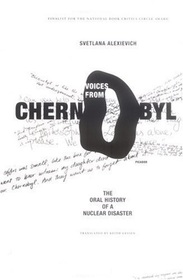Voices from Chernobyl: The Oral History of a Nuclear Disaster by Svetlana Alexievich received a 2015 Nobel Prize. It was a weird experience reading it in May 2020, especially with a global pandemic as a background; lines like "You feel how some completely unseen thing can enter and then destroy the whole world, can crawl in and enter you" take on a new meaning, a new impact.
Rather than tell the story of those most affected by that "unseen thing," radiation and its horrific aftermath from the Chernobyl disaster, Alexievich lets the survivors speak for themselves.
Some voices are more compelling than others, and the ones that are most disturbing and memorable are those of the widows of the "first responders," the men pressed into action, without any adequate protection, to shovel the roof of the reactor or blast a tunnel underneath it or turn the soil under or shoot pets left in the Zone. One woman sneaks into the hospital to see and help her newlywed husband, despite everything being "hot." A young woman ponders her friend's post-disaster baby with a smile stretched from ear to ear but no ears. One Chernobylite describes his little son wearing the cap he wore when volunteering at Chernobyl - and that son developing a brain tumor. Many of these voices discuss the lack of information they were ever given about the meltdown or radiation, and the need to do whatever their government asked of them.
A longer preface would be helpful, to give more context about the Chernobyl disaster and the chain of events that led to it. Also, many of the voices are not so much about the Chernobyl disaster but rather about the town of Chernobyl and the many who have flocked to it, despite its contamination. So many desperate Russian refugees, having nowhere else to go, have sought refuge in the beauty, albeit deadly, of the area surrounding the nuclear plant. How could an apparently idyllic life, although tough and economically depressed, compare to war in Chechnya? Elderly women till the soil and harvest potatoes and drink milk that is "hot" without understanding that what they can't see or taste or smell can kill them. The forest grows, lush and green, so how could it be dangerous?
The voices range from re-settlers to liquidators to university instructors to doctors to engineers to scientists. They form a chorus of witness and a chorus of warning. Hopefully we will take heed.
Rather than tell the story of those most affected by that "unseen thing," radiation and its horrific aftermath from the Chernobyl disaster, Alexievich lets the survivors speak for themselves.
Some voices are more compelling than others, and the ones that are most disturbing and memorable are those of the widows of the "first responders," the men pressed into action, without any adequate protection, to shovel the roof of the reactor or blast a tunnel underneath it or turn the soil under or shoot pets left in the Zone. One woman sneaks into the hospital to see and help her newlywed husband, despite everything being "hot." A young woman ponders her friend's post-disaster baby with a smile stretched from ear to ear but no ears. One Chernobylite describes his little son wearing the cap he wore when volunteering at Chernobyl - and that son developing a brain tumor. Many of these voices discuss the lack of information they were ever given about the meltdown or radiation, and the need to do whatever their government asked of them.
A longer preface would be helpful, to give more context about the Chernobyl disaster and the chain of events that led to it. Also, many of the voices are not so much about the Chernobyl disaster but rather about the town of Chernobyl and the many who have flocked to it, despite its contamination. So many desperate Russian refugees, having nowhere else to go, have sought refuge in the beauty, albeit deadly, of the area surrounding the nuclear plant. How could an apparently idyllic life, although tough and economically depressed, compare to war in Chechnya? Elderly women till the soil and harvest potatoes and drink milk that is "hot" without understanding that what they can't see or taste or smell can kill them. The forest grows, lush and green, so how could it be dangerous?
The voices range from re-settlers to liquidators to university instructors to doctors to engineers to scientists. They form a chorus of witness and a chorus of warning. Hopefully we will take heed.




![header=[] body=[Get a free book credit right now by joining the club and listing 5 books you have and are willing to share with other members!] Help icon](/images/question.gif?v=90afaeb39)
